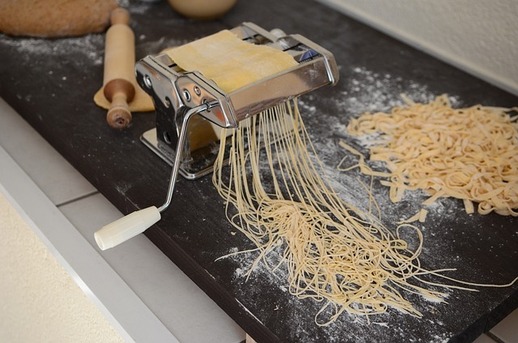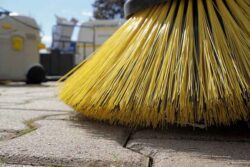
In the bustling world of commercial bakeries, where the aroma of freshly baked goods fills the air, ensuring food safety is paramount. One crucial aspect that often goes unnoticed but plays a pivotal role is the proper cleaning of bakery equipment. From ovens to mixers, cleanliness not only maintains the quality of the products but also safeguards the health of consumers. In this comprehensive guide, we will delve into the importance of commercial bakery equipment cleaning and provide you with simple yet detailed insights on the process.
Here is our post on Commercial Facility Exterior Cleaning: Curb Appeal and Maintenance which you will not want to miss.
The Significance of Cleaning in Bakeries
1. Preserving Product Quality
Regular cleaning is pivotal for preserving the quality of baked goods. Residual crumbs, grease, and contaminants can alter the taste and texture of products, ensuring that each batch meets the high standards expected by customers.
2. Compliance with Health Regulations
Health regulations mandate strict cleanliness standards in commercial kitchens, including bakeries. Adhering to these regulations is not just a legal requirement but a fundamental responsibility to ensure the safety and well-being of consumers.
3. Preventing Cross-Contamination
Bakeries handle a variety of ingredients, some of which may cause allergies. Proper cleaning prevents cross-contamination, protecting customers with allergies from potential health risks and demonstrating a commitment to responsible food handling.
4. Ensuring Customer Safety
Clean equipment is synonymous with customer safety. By eliminating potential hazards such as bacteria or allergens, bakeries create a safer environment for consumers, enhancing their trust and confidence in the establishment.
5, Maintaining a Positive Reputation
A clean bakery contributes to a positive reputation within the community. Customers are more likely to return to an establishment that prioritizes cleanliness, associating it with professionalism, quality, and care.
6, Extending Equipment Lifespan
Regular cleaning not only maintains the quality of baked goods but also extends the lifespan of equipment. Well-maintained machinery is less prone to breakdowns, reducing downtime and repair costs.
7. Streamlining Operations
A well-established cleaning routine becomes an integral part of bakery operations. It streamlines processes, making cleaning a systematic and efficient aspect of daily tasks rather than an occasional disruption.
8. Enhancing Employee Morale
A clean and organized workspace contributes to a positive work environment. Employees in a tidy bakery are likely to feel more motivated and take pride in their work, creating a harmonious atmosphere that benefits both staff and customers.
9, Preventing Flavor Contamination
Residual flavors from previous batches can linger on equipment surfaces. Proper cleaning ensures that each batch retains its intended flavor profile, preventing unintended flavor contamination and ensuring consistency in product taste.
10. Meeting Customer Expectations:
In the competitive bakery industry, customers have high expectations not only for the taste of the products but also for the overall cleanliness of the establishment. Meeting and exceeding these expectations through meticulous cleaning practices can set a bakery apart and foster customer loyalty.
Essential Bakery Equipment Cleaning Practices
1. Cleaning Schedule
Establishing a regular cleaning schedule is the foundation of a hygienic bakery. Daily, weekly, and monthly tasks should be outlined to ensure that no equipment is overlooked. A well-thought-out schedule simplifies the cleaning process and makes it a routine part of operations.
2. Cleaning Agents
Selecting the right cleaning agents is crucial. Mild detergents, sanitizers, and degreasers are commonly used in bakeries. Ensure that the cleaning agents are suitable for food contact surfaces and follow the manufacturer’s recommendations for dilution and usage.
3. Disassembly and Cleaning
Many bakery machines are intricate and consist of various parts. Disassembling equipment before cleaning allows for a thorough job. Scrubbing, soaking, and rinsing each component individually ensures that no hidden residue remains, promoting a hygienic environment.
4. Steam Cleaning
Steam cleaning is an effective method for tackling tough residues on ovens and baking sheets. The high temperatures help dissolve grease and grime, making it easier to wipe away. This method not only cleans but also sanitizes, an essential aspect in food safety.
See also our post on Commercial Ice Machine Cleaning: Ensuring Food Safety and Quality
Common Bakery Equipment and Cleaning Tips
Ovens
- Daily Scrubbing: Wipe down oven interiors daily to remove crumbs and residue.
- Deep Cleaning: Schedule deep cleaning at least once a month, focusing on hard-to-reach areas.
Mixers
- Disassembly: Take apart mixers for thorough cleaning of blades, bowls, and attachments.
- Sanitizing: Use food-safe sanitizers to ensure bacteria-free surfaces.
Dough Sheeters
- Flour Removal: Regularly remove excess flour to prevent buildup.
- Lubrication: Follow manufacturer recommendations for lubrication to keep parts moving smoothly.
Proofing Cabinets
- Ventilation: Ensure proper ventilation to prevent mold growth.
- Temperature Control: Regularly check and adjust the proofing cabinet temperature for optimal dough rising.
Here is our related post on Commercial Ice Machine Cleaning: Ensuring Food Safety and Quality which you will not want to miss.
Conclusion
In the world of commercial baking, the link between cleanliness and food safety cannot be overstated. Investing in employee training is essential for maintaining a clean bakery environment. Ensure that staff members understand the importance of hygiene, know the cleaning protocols, and are equipped with the necessary tools and protective gear.
Routine inspections are the key to identifying potential issues before they escalate. Managers should conduct regular checks to ensure that equipment is being cleaned according to the schedule and standards set by health regulations. Remember, a clean bakery is not only a legal obligation but a commitment to delivering safe and delightful treats to customers. Prioritize cleanliness, and your bakery will not only meet regulatory requirements but also build trust and loyalty among patrons.







